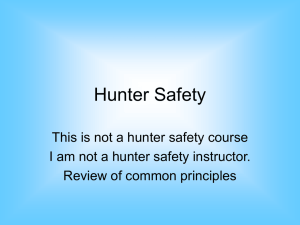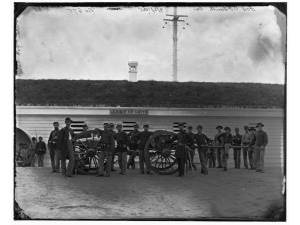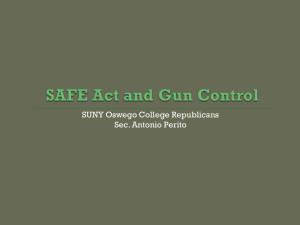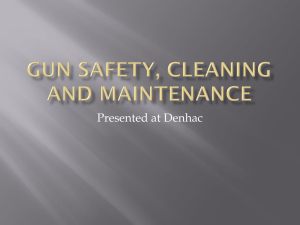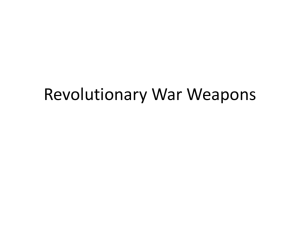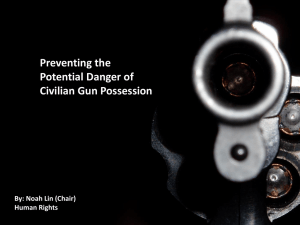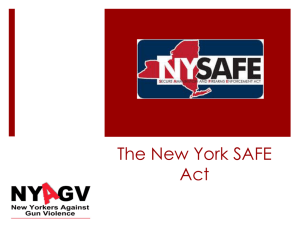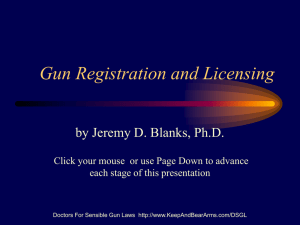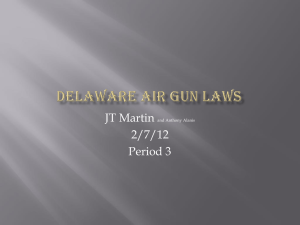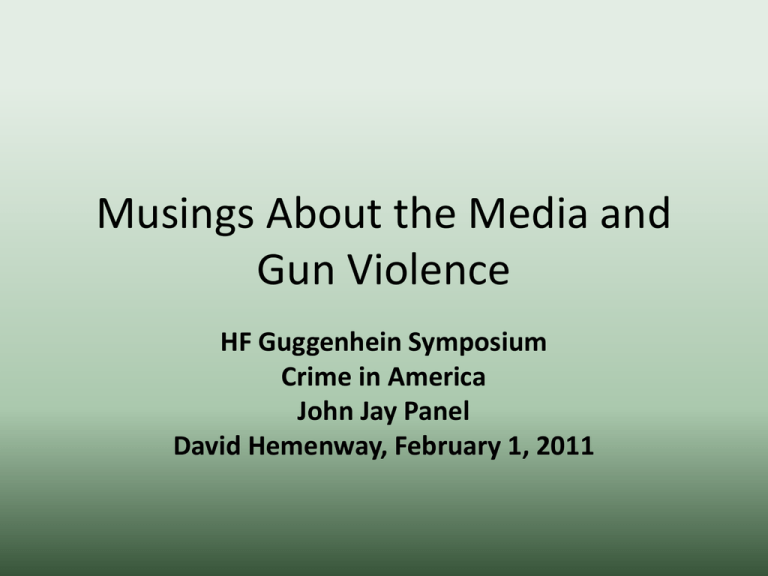
Musings About the Media and
Gun Violence
HF Guggenhein Symposium
Crime in America
John Jay Panel
David Hemenway, February 1, 2011
Summary of Academic Literature
on Guns
U.S. Public woefully misinformed
about most things including guns and
violence
• Most information comes from schools and
media
Raised in 1950s
Ozzie and Harriet
Leave It To Beaver
Naïve Ideal World:
• Media conducts surveys about what public
knows
• Act together to improve public knowledge
Media’s Role
• Media does not provide an epidemiologically
correct view of world
• 300+ million Americans
• 6+ billion people
Misperceptions Matter:
• (e.g. self-fulfilling prophesies)
• If people think neighborhood unsafe, no one
goes there, businesses languish, etc.
• Adolescents misperceptions about adolescent
smoking, binge drinking, sex, and gun carrying
Misperceptions Matter (cont.)
• Most Americans seem to believe we have
licensing and registration laws
• Given level of gun violence, these laws clearly
not working
Media Can Change Attitudes
• Designated Driver Campaign
• Motor Vehicle Crash Stories
– Wear seat belts
– Alcohol involved
• Gun Stories
– Where did the gun come from?
– What kind of world do we want to live in?
My Own Pet Peeves at Media
1. Parochialism
– No one outside the US can understand US
– Winning gun control argument outside US
•
“Do you want to end up like the US?”
– Don’t understand what an outlier the US really is
•
Plus role in fueling gun violence worldwide
Homicide, Suicide, and Unintentional Gun Deaths among 5-14 year olds:
The United States vs. 25 Other High Income Populous Countries, early 2003
Mortality Rate
Ratio
Homicides
Gun homicides
Non-gun homicides
Total
13.4
1.8
3.6
Suicides
Gun Suicides
8.0
Non-gun Suicides
1.2
Total
Unintentional firearm deaths
1.6
10.6
Yet U.S. has average rates of all other crime victims
Richardson & Hemenway J Trauma 2011
My Pet Peeves
2. Simplistic view of the world:
Black/White
a.) pro gun vs. anti-gun
Pro public health not: anti-car
anti-swimming pool
anti-stairs
a1.) gun rights advocates vs. …?
My Pet Peeves
2. Simplistic view of the world: Black/White (cont.)
b.) Guns everywhere vs. No guns
“Gun Control” equals banning handguns
Policy Spectrum
My Pet Peeves
2. Simplistic view of the world: Black/White (cont.)
c.) Criminals and Decent,
Law-Abiding Citizens
“Bad Guys” and “Good Guys”
In Arizona, a “good guy” with legal and easy
access to all firearms
He would not have gotten access in other
countries.
E.g. Canada Law
Acquisition of a Handgun
1. Firearms License
2. Proof of legitimate purpose
3. Criminal background check
4. Training certificate
5. 2 references who sign application
6. 28 day waiting period
7. Handgun magazine restricted to 10 rounds
My Pet Peeves
2. Simplistic view of the world: Black/White (cont.)
d.) Guns are only thing that matters, or
guns don’t matter at all
• Urban-rural
• Switzerland, Israel
• Canada- Bowling for Columbine
My Pet Peeves
2. Simplistic view of the world: Black/White (cont.)
e.) Gun control works perfectly or
doesn’t work at all
“Germany had a school shooting, doesn’t that
prove gun control is ineffective?”
My Pet Peeves
3. Argument by Anecdote
–Washington, DC
–“My father never smoked, yet died of
heart disease”
–“Japanese smoke more than US, yet
have lower rates of heart disease”
Anecdotes vs. Studies
Violent Deaths High-gun States vs. Low-gun States,
2001-2004, U.S. Children (aged 5-14)
Mortality Rate Ratio
High-Gun States
Total population,
5-14 Year Olds (2001-2004)
Low-Gun States
(High Gun : Low Gun)
21.0 million
21.7 million
Homicides
Gun homicides
Non-gun homicides
Total
97
80
177
41
70
111
2.4
1.2
1.6
Suicides
Gun Suicides
Non-gun Suicides
Total
68
106
174
5
74
79
14.1
1.5
2.3
67
7
9.9
Unintentional firearm
deaths
The 15 States with the highest average levels of household gun ownership (based on the 2001 Behavioral Risk Factor Surveillance
System) were WY, MT, AK, SD, AR, WV, AL, ID, MS, ND, KY, WI, SC, UT, and LA. The 6 States with the lowest average gun levels
were HI, MA, RI, NJ, CT, and NY.
Source: WISQARS
My Pet Peeves
4. “Both Sides”
20 studies vs. 1 study
Science vs. she said/he said
Effect of Repeals of Motorcycle Helmet Laws
HOW CAN ACADEMICS
HELP MEDIA?
What we are currently doing:
1. Firearms Research Digest:
– A searchable database of summaries of all
academic firearm articles
– www. firearmsresearch.org
What we are currently doing:
2. Bulletins
• Comparing the Incidence of Self-Defense Gun
Use and Criminal Gun Use
• Carrying Concealed Weapons (CCW) Laws:
From “May Issue” to “Shall Issue”
WHAT ELSE CAN WE DO?
“While We Were Sleeping”
Success Stories in Injury Prevention
U Cal Press (2009)
David Hemenway, PhD.
Harvard Injury Control Research Center
Harvard School of Public Health
Importance of Firearms Trace Data
• Many gun policies focus on preventing the diversion of
guns from the legal to illegal markets.
• Trace data allow monitoring of these diversions. Brief
interval (e.g., < 1 year) from retail sale to crime by nonpurchaser is marker for illegal diversion.
• Report of crime gun trace data showing Milwaukee gun
dealer’s contribution to crime guns led dealer to stop
selling junk guns. Diversions dropped 73% (Webster, Vernick,
Bulzacchelli, 2006).
• Trace data used to identify gun dealers to target for
undercover stings and lawsuits which were followed by
sharp reductions in guns diverted to criminals (Webster,
Vernick, Bulzacchelli, Zeoli 2006).
Importance of Firearms Trace Data
• Trafficking indicators negatively associated with state
policies regulating private sales and oversight of retail
sellers (Webster, Vernick, Bulzacchelli, 2009)
• States with comprehensive gun sales regulations have
very few in-state guns used in crime (Webster, Vernick, Hepburn,
2001).
• Absence of gun seller accountability policies associated
with greater exporting of crime guns to other states
(Mayors Against Illegal Guns, 2010).
• If trace data wasn’t important to industry accountability,
the gun lobby wouldn’t have made hiding gun data a
priority in passing the Tiahrt amendments.

